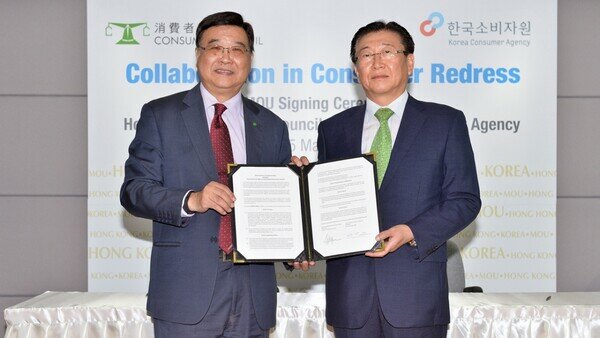The Hong Kong Consumer Council and the Korea Consumer Agency have entered a joint agreement for co-operation in a new mechanism for information exchange and consumer complaint resolution. This followed the signing of a Memorandum of Understanding (MOU) between the two consumer protection organisations in Hong Kong today (May 25). The MOU seeks to strengthen the effectiveness in dealing with rising cross-border consumer disputes. The new mechanism will cover not only complaints in purchases made by visitors in both places but will also be applicable to disputes arising from internet purchases.
Under the MOU, consumers of the two places can now lodge their purchase complaints with the respective party to the agreement in their home place for redress; and their cases would be referred to the other party for handling. This helps overcome the language barrier and geographical and jurisdiction problems that limit consumers in the past from filing their complaints, and thus greatly enhances consumers’ rights and interests.
The traffic between Hong Kong and Korea has been on the rise in recent years, in particular Korean products such as fashion and cosmetic and skincare goods are the favourite choice of many Hong Kong consumers. Tourism figures indicated that the number of visitors from Hong Kong to Korea rose from 520,000 in 2015 to 650,000 in 2016, a 24% increase. Dubbed “shopping paradise”, Hong Kong has become a popular holiday destination to Korean visitors and attracted nearly 1.4 million Korean tourists last year, an increase of 12% from 1.24 million over the preceding year.
The upsurge in visitors has possibly brought an increase in consumption disputes but because of their tight itinerary, language barrier, or even other factors such as the relatively small purchase amounts involved in travel, consumers would generally opt to avoid trouble by deferring their complaints. Even though they have encountered disputes or unscrupulous sales tactics, they brought the dissatisfaction home and eventually gave up its right to seek for redress. It would still be very difficult for them to pursue their claims even if they want to do so.
Moreover, online retail activities between Hong Kong and Korea have flourished with increasingly prevalence of online shopping. But again, differences in languages, legislations and business practices have been the major obstacles to the handling of the cross-border consumer disputes between the two places.
The consumer dispute referral mechanism established pursuant to the MOU signed between the two consumer protection organisations effectively addresses the said consumer issue. The Chairman of the Hong Kong Consumer Council, Prof. Wong Yuk-shan said, “This is the very first time the Council has signed a co-operative agreement with a consumer protection organisation abroad, a most important step forward in the safeguard of consumer rights and interests. I look forward to keeping close ties and co-operation with our Korean counterpart in our mutual drive for consumer betterment.”
The President of the Korea Consumer Agency Mr. Han Kyeon-pyo stated, “The MOU would allow the Korea Consumer Agency and the Hong Kong Consumer Council to strengthen cooperative partnerships so that the two could firmly establish itself as a global consumer protection agency in the future.”
In accordance with the MOU, visitors experiencing any consumer dispute with shops in another place will be entitled to file their complaints after return home with their local consumer bodies for redress. Upon receipt of the complaint and the consent of the complainant, the receiving party will refer the case details and relevant documents, in English, to the other party which will be responsible to help seek redress for the consumer.
An evaluation of the case will be made prior to conciliation work being carried out to resolve the dispute by the receiving party. If the shop concerned agrees to a settlement proposal, the outcome will be passed on first to the referral party and then to the complainant upon his/her consent for acceptance before making a reply. It helps solve the multiple problems arising from language and geographical barriers, and jurisdictional differences, encountered by a consumer organization in handling cross-border consumer disputes.
The Hong Kong Consumer Council recorded a total of 517 complaint cases from visiting tourists (not including mainland China) last year, an increase of 6% year-on-year; among the cases 5 (or 1%) were from Korean visitors. The Korea Consumer Agency, on the other hand, received 11,118 complaint cases in relation to foreign tourists and foreign transactions last year, a 24% rise year-on-year.
The Hong Kong Consumer Council and Korea Consumer Agency expect that with the development of online purchase coupled with continual rising numbers of tourists between Hong Kong and Korea, there will be greater challenges ahead. Looking forward, this MOU not only will do well to facilitate both organisations in resolving cross-border consumer complaints, but will also play an active and positive role in promoting the travel and retail industry in both places in the long run.
About the Korea Consumer Agency
The Korea Consumer Agency is a government organisation established in 1987 in accordance with the Consumer Protection Act in order to effectively implement Korean consumer protection policies. Its founding principle is to protect consumer rights and interests, to promote a rational consumption life and to contribute to the sound development of the nation's economy.
About the Hong Kong Consumer Council
The Hong Kong Consumer Council is a statutory body established in 1974. Pursuant to the Consumer Council Ordinance, the Council’s functions are to protect and promote the interests of consumers of goods and services. The Council strives for a safe and sustainable environment for consumers in a fair market.



